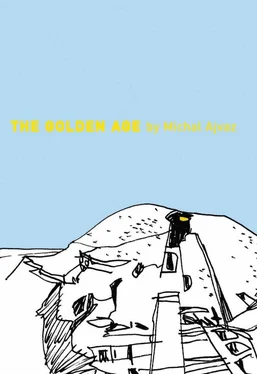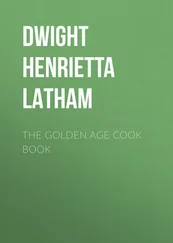Michal Ajvaz - The Golden Age
Здесь есть возможность читать онлайн «Michal Ajvaz - The Golden Age» весь текст электронной книги совершенно бесплатно (целиком полную версию без сокращений). В некоторых случаях можно слушать аудио, скачать через торрент в формате fb2 и присутствует краткое содержание. Год выпуска: 2010, Издательство: Dalkey Archive Press, Жанр: Современная проза, на английском языке. Описание произведения, (предисловие) а так же отзывы посетителей доступны на портале библиотеки ЛибКат.
- Название:The Golden Age
- Автор:
- Издательство:Dalkey Archive Press
- Жанр:
- Год:2010
- ISBN:нет данных
- Рейтинг книги:4 / 5. Голосов: 1
-
Избранное:Добавить в избранное
- Отзывы:
-
Ваша оценка:
- 80
- 1
- 2
- 3
- 4
- 5
The Golden Age: краткое содержание, описание и аннотация
Предлагаем к чтению аннотацию, описание, краткое содержание или предисловие (зависит от того, что написал сам автор книги «The Golden Age»). Если вы не нашли необходимую информацию о книге — напишите в комментариях, мы постараемся отыскать её.
is Michal Ajvaz’s greatest and most ambitious work.
The Golden Age
The Golden Age — читать онлайн бесплатно полную книгу (весь текст) целиком
Ниже представлен текст книги, разбитый по страницам. Система сохранения места последней прочитанной страницы, позволяет с удобством читать онлайн бесплатно книгу «The Golden Age», без необходимости каждый раз заново искать на чём Вы остановились. Поставьте закладку, и сможете в любой момент перейти на страницу, на которой закончили чтение.
Интервал:
Закладка:
One morning the girl descends to the terrace from her room to find that the roofs of the houses in the town below and the trees of the hills have been coated with snow. (The picture has been changed in the slide projector.) The old man is standing on the terrace already, looking pensively at the white scene with its gentle touches of grey. The girl stands next to him and they study together the snowy landscape and the cable car rising slowly through the white pass in the forest on the hillside opposite. They have been standing in silence for quite a while when the old man begins to speak of the royal court on Vauz, of that last supper by the sea, of the shameful murder in the post-mortal city, of the burning deserts of the second underworld in which he ended up after Isili and the squid killed him. He is Dru. And as he is speaking, everything comes back to the Isili-student; she rests her head against the cold glass of the window lit by the snow of Heidelberg on the Neckar, as images from her memory rise up from the dark chasm within her.
Then she weeps quietly and asks Dru for his forgiveness.
“I forgave you when I was still in the desert of the second underworld. I knew you’d show up here. I’ve been waiting for you for years, since before you were even born. And trust me, it’s not so I can take my revenge on you.”
“How did you know I would come?”
“When I was living in the second underworld, I reached its outermost frontier. There I came across a great abandoned palace — perhaps it had been the palace of some god who had left for another cosmos. I walked its corridors and studied the frescoes depicting the past and the future of the universe that adorned them. It was in one of these that I saw the two of us sitting at breakfast on this terrace; it was clear from the picture that we were not meeting for the first time. Perhaps you have heard of Heidelberg Man?”
“Protanthropus heidelbergensis. An anthropoid. Its jaw was found in Mauer — not far from here — in 1907.” The girl was quoting from a coursebook in anthropology.
“That jaw belonged to you. Way back when you and I lived together in the forests here. It wasn’t a bad life — indeed, it was every bit as beautiful as your life in the ocean deep, which I also saw in the frescoes. I always expected to meet the squid in Heidelberg, too. I asked myself for ages who it might be; there was a time when I believed it to be Professor Gadamer from the university, but one evening when I was sitting in the Florian wineroom, its owner came in and I knew straight away that he was the one. And he recognized me as well; he joined me at my table and had a good bottle brought up from the cellar. We sat there drinking together until morning. He told me about your life together in the ocean; we made good our differences and became friends. These days we take walks together in the woods above the city. We’ve both been waiting for you here. You must go and see him — he’ll be delighted to see you. Don’t worry, in future lives we’ll love each other again; we’ll also persecute and hate each other, fight and kill each other on both sides of the frontier of death. But for the time being, we can spend a few years here in tranquillity. Hölderlin wrote — a long time ago, admittedly — that Heidelberg was the most beautiful of Germany’s smaller cities. And just look at the peace that rests in its streets and the squares of the old town. The walls breathe with a silent joy, and it is a joy to walk its hills and sit in its university library studying from volumes whose pages are bathed in a calm light. Let us pass here our short golden age, an age we’ll often look back on during the trials and in the despair of our lives to come.”
The play at Revnice had not finished yet, but by this time I was tired; at the end of the Heidelberg scenes I slipped out of the audience and went down to the station. As I sat under a glaring bulb in an empty carriage of the late train, I thought how strange it was that the Revnice play had grafted motifs from the island’s Book onto philosophies of reincarnation and pessimism, ideas very distant from the islanders’ view of the world. I had written down the name of the company that produced the play, thinking I would get in touch with the actors at their Prague base and ask who the author was and where they discovered him, but then I dropped the idea. I was pretty sure what they would tell me: either the play was written by someone who had spent some time on the island, come across the Book there, and used some of its motifs in his work, or else some visitor to the island had told the natives about the play and then part of its story had been incorporated into the Book . The Book was open — it drew in stories from other books, plays or films and transformed them, and naturally it was willing to release its own story-lines and images for use in the literatures of other nations. Perhaps many motifs in works of literature of international renown have their origins in the Book ; there is no way of knowing this for sure — the Book changes so quickly that whatever escapes from it to find lasting form on the pages of other books or theatre stages, transforms and then perishes in the Book .
Taal’s task
Fo was carried into the palace with his book. After Fo’s death, Taal has his son’s work published in many thousands of copies and instructs everyone on the island to buy it. In addition to this, the king has several copies produced on the finest handmade paper as facsimile publications; these are kept in leather cases set with red, green and violet gemstones. Fo’s lettering is faithfully transcribed in all its transformations, and on the back of the sheets Fo’s text is woven around the lines of the forester’s records, just as it was in the cabin. The facsimile describes not only the story of the unfortunate Dru but also the story of Fo’s script, which is beautiful in its early guises but becomes ever more distorted as the fever takes hold. The letters were infected by the diseases of Fo’s thoughts, but perhaps the letters stirred the sickness in Fo by the piercing gaze they fixed upon him. The facsimile told of the fates of letters that became more and more akin to demons; these demons became lords of the text, shuddering, fraying and shrivelling until they were transformed into the monstrous letters of Umurian (woven somnambulistically around the clumsy letters of the woodsmen). Taal has Fo’s original manuscript placed in a gold box that he has specially made for it, and this is placed in the treasury guarded by the deadly, impassable labyrinth.
The king’s pain suddenly transforms into hatred for the woman he believes to be the cause of Fo’s death. One day he summons Mii to the audience chamber. This vast darkened hall seems to Mii to be empty as she makes her way across it; only when she is almost at its end does she see a slight movement in the gloom. Taal speaks. Since the death of his son, Taal has avoided the light. Curtains are drawn across windows and shawls thrown over lamps. The weary voice that comes out of the nest of shadows tells Mii it wishes her to honour Fo’s memory by the creation of a statue that depicts one of the scenes in his novel. This time the sculptress lacks the courage to refuse. She senses that Taal wishes to destroy her, that Taal would welcome her refusal as justification for her imprisonment or execution. There is a long silence during which nothing moves in the gloom. The audience appears to be at an end, so Mii curtseys and begins her retreat across the long, empty hall.
But she knows how cunning Taal can be and of his liking for the staging of dark, sinister acts, so the feeling of disquiet does not leave her. And before she reaches the door, Taal speaks again.
Читать дальшеИнтервал:
Закладка:
Похожие книги на «The Golden Age»
Представляем Вашему вниманию похожие книги на «The Golden Age» списком для выбора. Мы отобрали схожую по названию и смыслу литературу в надежде предоставить читателям больше вариантов отыскать новые, интересные, ещё непрочитанные произведения.
Обсуждение, отзывы о книге «The Golden Age» и просто собственные мнения читателей. Оставьте ваши комментарии, напишите, что Вы думаете о произведении, его смысле или главных героях. Укажите что конкретно понравилось, а что нет, и почему Вы так считаете.












